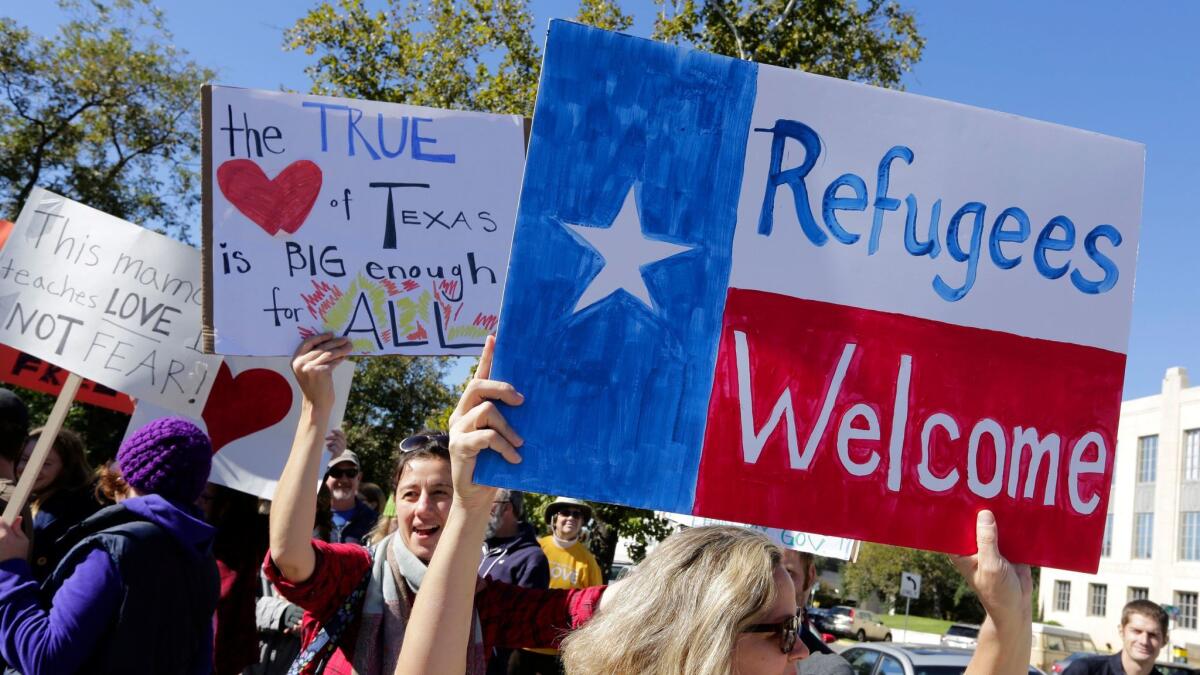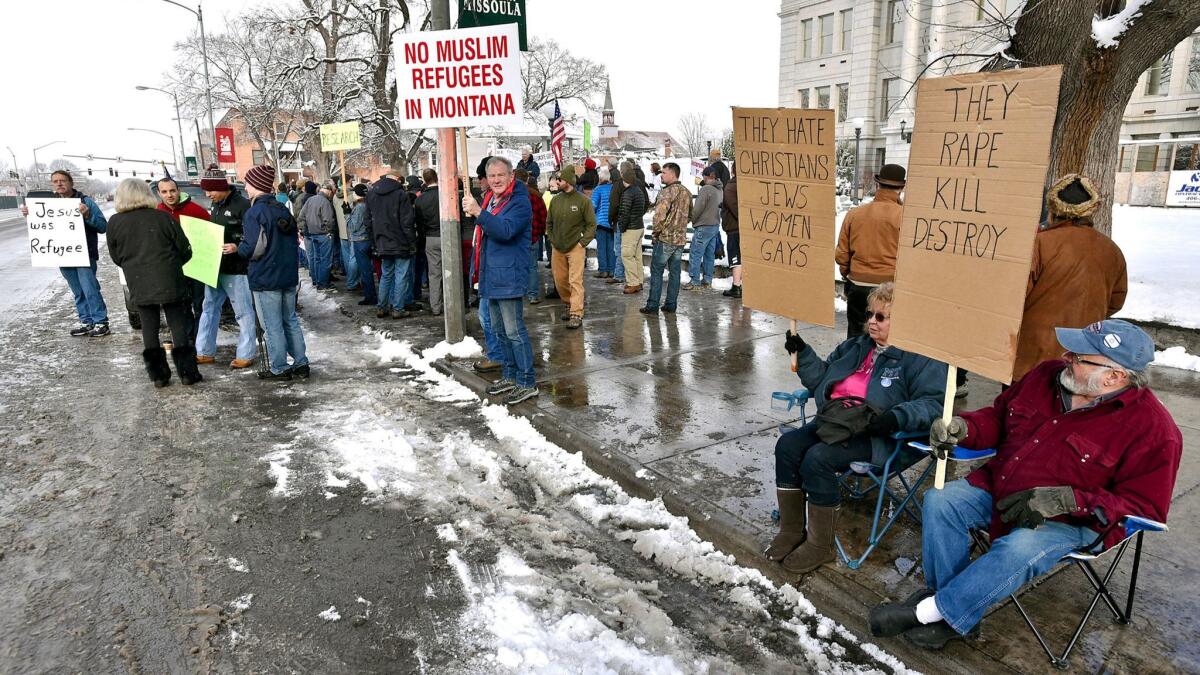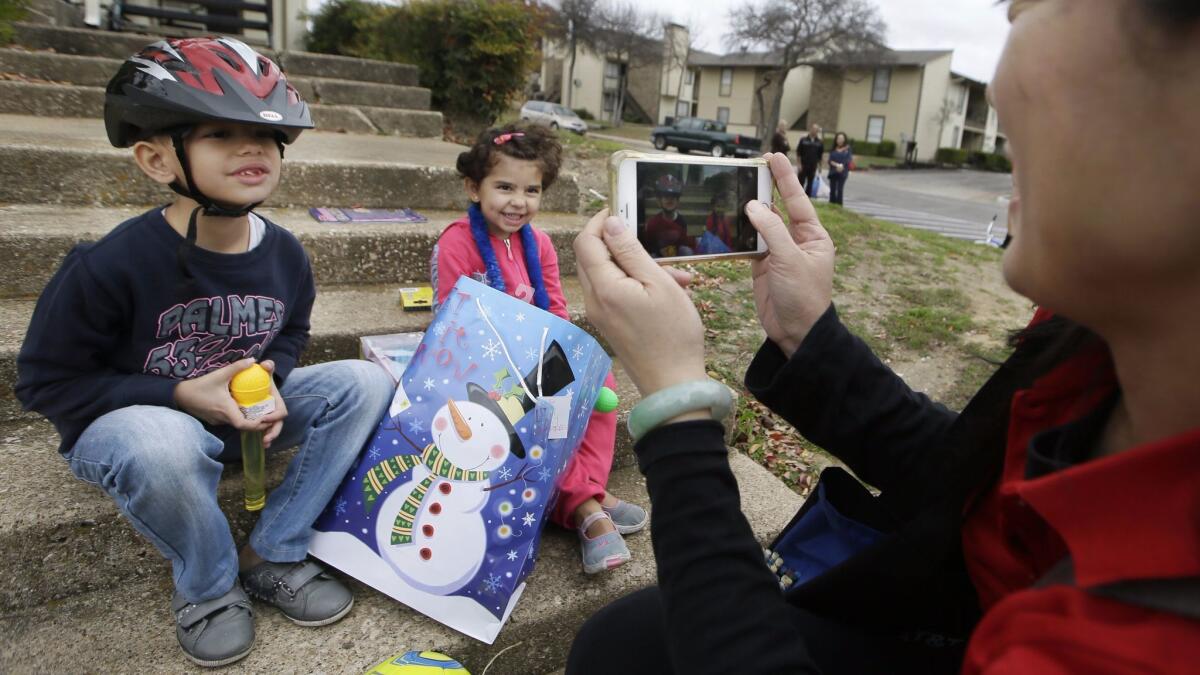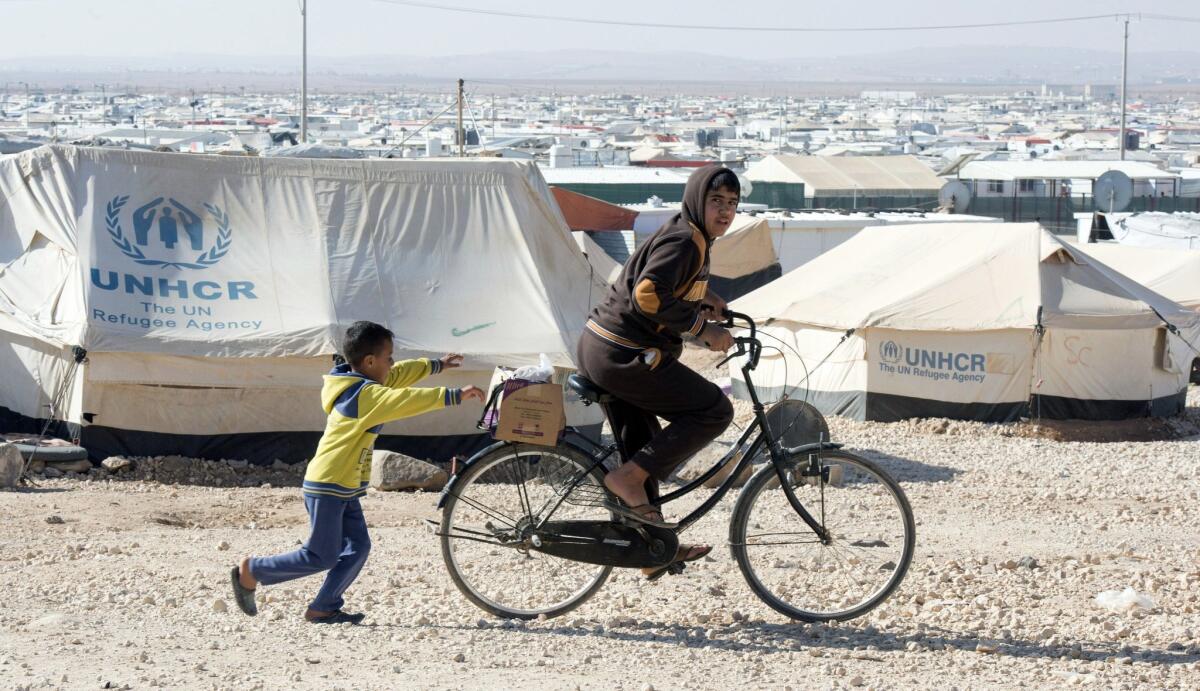Draft of Trump plan to halt refugee flow to U.S. causes alarm, but some welcome the idea

A plan to temporarily suspend the U.S. refugee resettlement program has alarmed human rights activists, who argue that the new measures could separate families, further endanger those fleeing conflict and discredit America’s long legacy of providing safe harbor for the world’s most vulnerable people.
Advocates for a more stringent immigration policy cheered the proposal being considered by President Trump, saying he was making good on a campaign promise to stem immigration and reassess the country’s access to refugees.
The proposed changes in the refugee program, included in a draft executive order obtained by the Los Angeles Times, would suspend refugee admissions from all countries for 120 days, bar migrants from war-torn Syria for the foreseeable future, and limit the total number of refugees allowed into America at 50,000 for fiscal year 2017, among other measures.
The draft describes the goal as “protecting the nation from terrorist attacks by foreign nationals.”
“Taking a temporary pause in refugee admissions is a prudent and effective approach to ensuring that national security vetting is in place and working,” David Ray, communications director for the Washington-based Federation for American Immigration Reform, said in an email. “Clearly, there’s much less risk in focusing resources on settling refugees in nations closer to their homes in hopes of their safe return one day. For every dollar we spend on settling a refugee in the U.S., we could do $10 worth of good overseas.”

But Margaret Huang, executive director of Amnesty International USA, was sharply critical. “It’s going to have an enormous impact and unfortunately a very negative one,” she said. It “essentially prohibits the resettlement of refugees who are in urgent need of safety and a place to rebuild their lives.”
Who qualifies as a refugee?
According to the United Nations high commissioner for refugees, a refugee is someone who has been forced to flee his or her country because of war, violence or a well-founded fear of persecution for reasons of race, religion, nationality, political opinion or membership in a particular social group. They differ from migrants who might forsake their homeland for various other reasons, such as to seek work, get an education and improve their lives.
The largest number of refugees resettled in the U.S. in 2016 came from the Democratic Republic of the Congo — about 16,370 people — according to data from the State Department. Syrian refugees made up the second-biggest group, with 12,587 resettled in America last fiscal year.
What are the key mandates of the draft executive order?
The order mandates the suspension of the U.S. Refugee Admissions Program for 120 days while the secretaries of State and Homeland Security review the program’s application and adjudication process and determine whether additional measures are required to “ensure that those approved for refugee admission do not pose a threat to the security and welfare of the United States.”
Refugees already in the pipeline would be permitted to enter the country once any revised procedures have been put in place, according to the order.

Once the 120 days expire, only nationals from countries determined to have sufficient safeguards in place to guarantee the security and welfare of America would be allowed into the country.
The U.S. accepts more refugees for resettlement than any other country, according to the U.N. refugee agency, although other nations exceed the U.S. on a per capita basis.
The Obama administration announced last year that it wanted to increase the refugee intake in fiscal year 2017 to 110,000, up from 85,000. Trump’s draft executive order mandates processing and admitting a total of 50,000 refugees this fiscal year.
Who would be affected by the new policy?
If signed, the order would give priority for resettlement to refugees facing religious persecution, so long as the refugee belongs to a minority religion in his or her country of nationality. This would essentially bar, or at the very least push back, resettlement applications from Muslims fleeing predominantly Muslim nations, such as Iraq and Somalia.
Syrian refugees, who have accounted for the largest refugee flow in the world in recent years, would be completely blocked from entering the U.S. until the president decides that satisfactory changes have been made to the refugee resettlement program “to ensure its alignment with the national interest,” the order said.
Muslim and Arab groups were among several civil and human rights organizations that denounced the proposed changes, saying they would have a disproportionate effect on Muslims.
Muslims are the “sole target of these orders,” Nihad Awad, executive director of the Council on American-Islamic Relations, said at a news conference at the organization’s Washington headquarters. He called them “a disturbing confirmation of Islamic and un-American policy proposals made during the presidential election campaign.”
“The orders will tarnish our image in the Muslim world, making us seem uncaring and hardhearted,” Awad said. “This ban does not make our country safer. Instead it serves to stigmatize Muslim refugees and the entire Muslim community.”
What are some of the likely implications of the new policy?
Civil rights observers and global development analysts said the policy could send a negative message about U.S. engagement in helping to resolve the calamity in the Middle East.
“There is a much larger symbolic impact in terms of the global responsibility to resettle refugees and the responsibility to address the crisis that is destabilizing the region,” said Cindy Huang, a visiting policy fellow at the Washington-based Center for Global Development and an expert on migration and refugees (and no relation to Margaret Huang, the Amnesty official). “It’s not just the number of those who would not be able to come to the U.S.; it’s about what this is signaling about the U.S. and its role in addressing the larger crisis.”

Human rights activists expressed concern that the proposed rules for refugee resettlement would cause other nations to copy America’s actions.
“Other countries could say if the U.S. is not accepting refugees, why should we?” said Huang of Amnesty.
The domestic situation for host countries could also be exacerbated, Huang said. Right now, more than half of the world’s 21 million refugees live in just 10 countries, according to Amnesty: Jordan, Turkey, Pakistan, Lebanon, Iran, Ethiopia, Chad, Uganda, Kenya and the Democratic Republic of Congo. These countries account for less than 2.5% of the world’s gross domestic product, the monetary value in goods and services produced by countries, according to the human rights group.
The limiting of refugee entry to the U.S. would “have a severe economic impact on those countries,” Huang said. They “may decide to turn people away and send them back to unsafe situations.”
The order states that “deteriorating conditions in certain countries due to war, strife, disaster and civil unrest increase the likelihood that terrorists will use any means possible to enter our country.”
Advocates for tougher screening of refugees share this concern.
“A pause in refugee admissions in order to review vetting procedures is a critical step to protecting the homeland,” said Ray, the spokesman for the Federation for American Immigration Reform. “As former President Obama’s own top national security officials testified, the vetting process for refugees arriving from countries known to be hotbeds of international terrorism is dangerously inadequate. These radical Islamic terrorist networks are attempting to use the refugee system to infiltrate the U.S. and kill innocent Americans.”
However, Georgette Bennett, founder of the New York-based Multifaith Alliance for Syrian Refugees, a nonpartisan coalition of faith-based and secular organizations whose goal is to raise awareness of the Syrian refugee crisis, said that although the order was being presented as a response to national security, “it might in fact be counterproductive in terms of national security.”
“If we don’t rescue people who are left in limbo, then we have a population that has nothing left to lose,” Bennett said. “That’s a very dangerous population.”
Bennett, whose group works to debunk misconceptions about Syrian refugees, said it was “extraordinarily difficult for extremists and terrorists to sneak into the U.S. because the refugees are thoroughly vetted before they set foot on American soil.”
She cited a 2016 study by the Cato Institute that found “there is a 1 in 3.6 billion chance of being killed in a terrorist attack on U.S. soil by a holder of a refugee visa,” compared with a 1 in 14,000 chance of being killed by a native-born American.
“The notion of completely shutting down all resettlement of Syrian refugees does not seem to be based on fact,” Bennett said. “It’s based on fears that are not substantiated, and it’s based on misinformation.”
Times staff writer Jaweed Kaleem contributed to this report.
For more on global development news, see our Global Development Watch page, and follow me @AMSimmons1 on Twitter
ALSO
Trump’s order to begin wall construction opens wider rift with Mexico
British Prime Minister Theresa May is expected at the White House this week
More to Read
Sign up for Essential California
The most important California stories and recommendations in your inbox every morning.
You may occasionally receive promotional content from the Los Angeles Times.











